I went into Cardigan Town today. I add Town so as to avoid confusion with the knitted garment. It’s where I live, in West Wales. Today, after 549 days of drizzle and grey rain the sun is shining. I felt it on my face, on my shoulders. I took my jacket off. I dawdled with my errands (post office, chemist, all the exciting things). I noticed things, snowdrops, daffodils, people’s smiles. Sunshine makes people smile, it makes them open up.
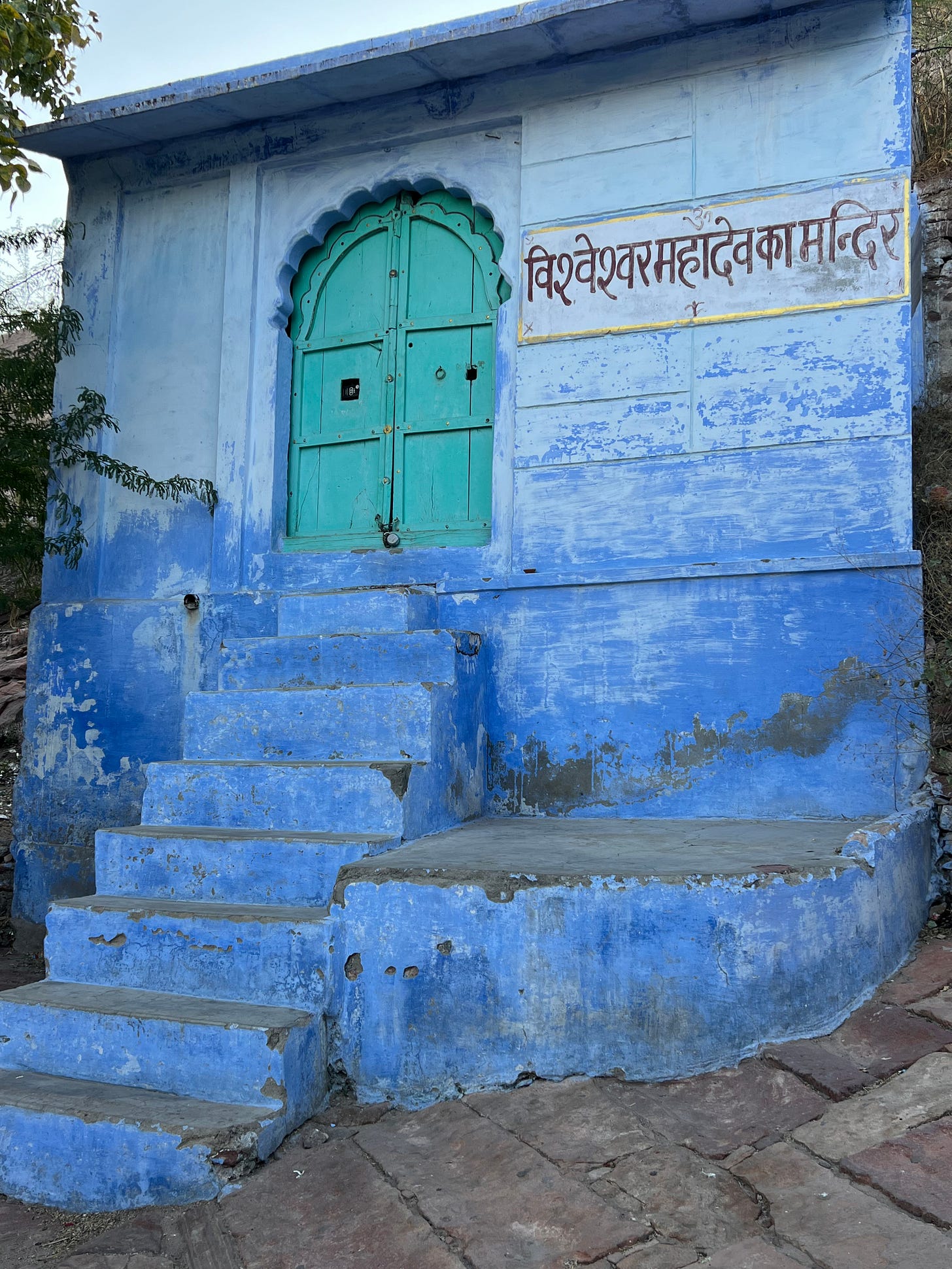
Jodhpur was sunny when I was there, and suspect still is, and everyone seemed to smile there too. On arrival off the red eye plane from Delhi (it’s not really a red eye but it was early) at the tiny blue and white airport we were greeted by the back of a soldier, standing up on a jeep apparently randomly aiming a large gun outward. There was clearly no intent to deploy the weapon, he just had it there, in case of something. No one seemed bothered by this so I decided not to be either.
We headed to our hotel knowing it was too early to check in but reluctant to lug luggage around, feeling sure they wouldn’t mind if we dumped the stuff and ourselves (did I mention early start?) while waiting for the rooms to be ready.
They didn’t mind, and we were welcomed onto a luscious garden terrace, golden yellow tablecloths against a backdrop of deep green foliage, and offered coffee and breakfast to which we responded very enthusiastically.
Never order a poached egg in a place you don’t know, is what I will forever tell myself from now on. Andrew, like the gent he is, swapped my almost raw egg swimming in water for the bouncy scrambled version he ordered. The coffee hit the spot though.



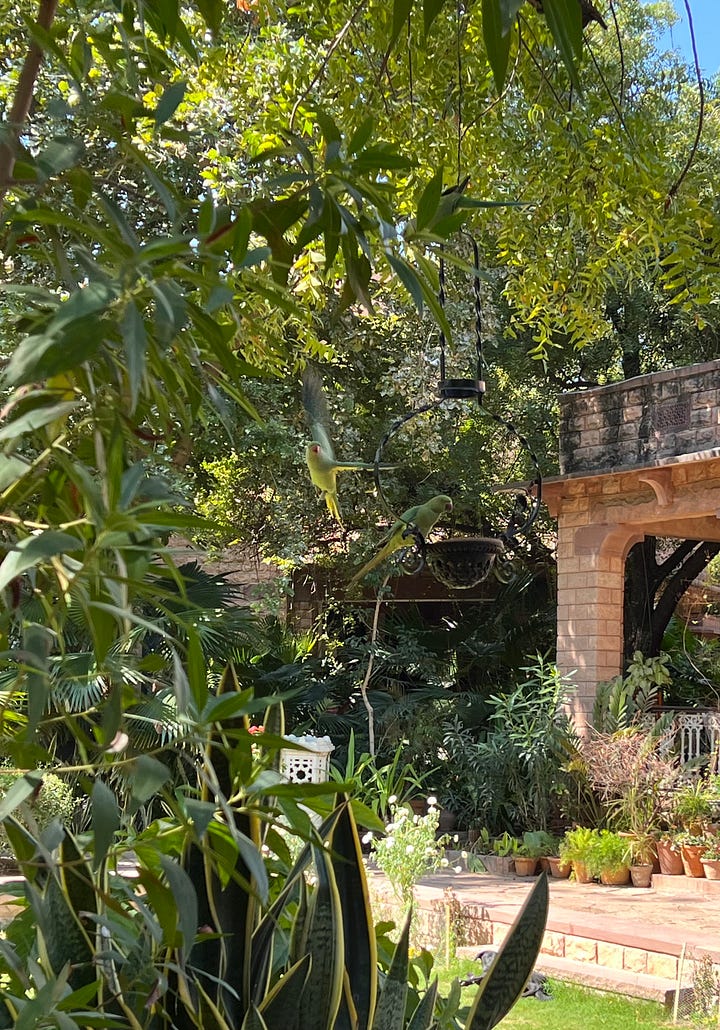
Anyway - we sat around for a while, Andrew doing work, me drawing on my iPad, while swinging on the swing seat overlooking the lily pond, fountain tinkling. The warmth of the sun creeping in, bones and muscles relaxing after the relative chill and insanity of Delhi, plus very early morning start. Did I mention the early start? I’m not a fan of 5am wake ups.
Jodhpur is known as the blue city. Or Blue City? Jodhpur, Rajasthan, India (pop: 2.5million), like Cardigan, Ceredigion, West Wales, UK. (pop: 4000), is named after an item of clothing, so I have now officially twinned them. The plaques are in the post.
The city hums, beeps and bellows around the Clock Tower market, alleyways and roads creating a rectangle around it. It’s not the only market, nor is the centre centre of the city but it was ours for the time of our visit.
Cafe Sheesh Mahal, just off the Clock Tower main square is owned and run by Jagmal. Jagmal doesn’t believe in social media and all that internet stuff, relying on old school Lonely Planet and other guide books. He serves good coffee and has no truck with people who don’t understand good coffee. He serves a very small and eclectic menu including toasted cheese and club sandwiches. The cheese toastie was interesting - think dairylea with some green paste added. The club was similar with lettuce. In white sliced. In the quest for authentic Indian food this registers approximately -12 but I applaud Jagmal’s total disregard for such fads. Also during another visit (because it’s a fabulous space, quiet, light, comfortable with it’s own small library and Jagmal is great) when I requested mint tea, after readjusting his eyebrows, he went to the market to get some fresh mint it make it. He brought normal teabags on a saucer to add to it if I wished, which I didn’t. Thus two cultures met and accommodated one another. Take your own loo roll.

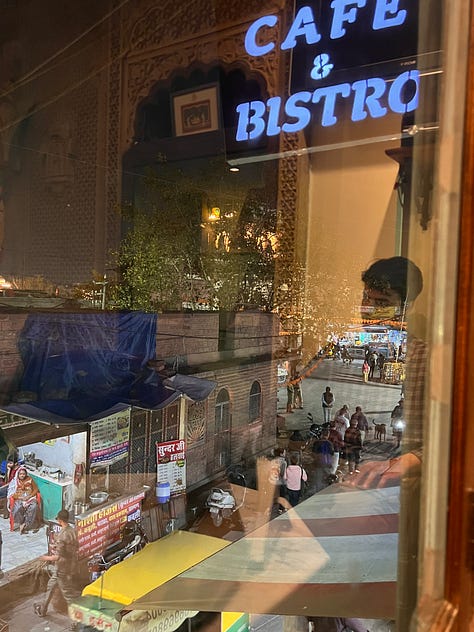
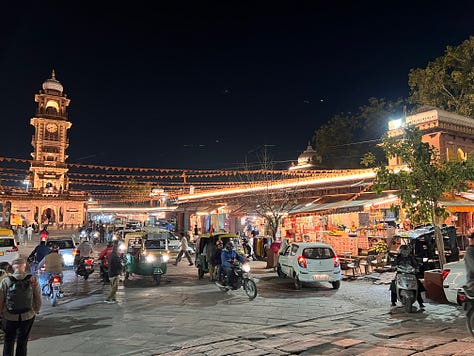
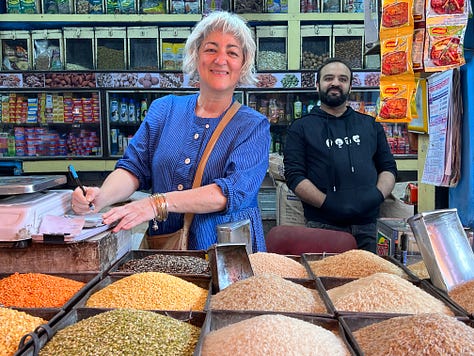
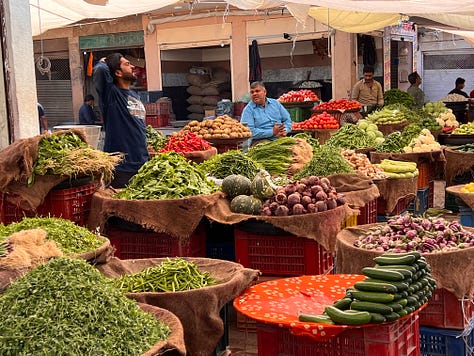

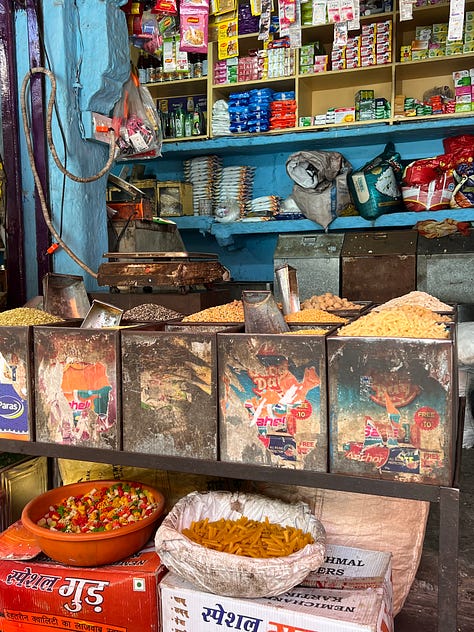
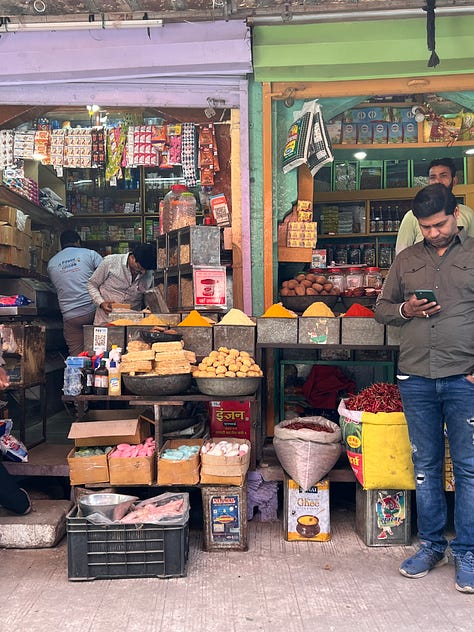

The market is a hubbub. All markets are hubbubs aren’t they? Even our ever dwindling open air markets are buzzy, the proper ones stages for some excellent shouting of wares and bad puns in mockney rhyming slang. But Indian markets seem to take it all to the next level, literally in some cases because much of the activity is at foot level as well as ‘counter’ level. Everything is happening, all at once, productivity is high, selling techniques are masterful and relentless, especially toward the palid wide eyed tourist type. Our western world mantra of reduce, reuse, recycle (which we mostly read as recycle in order to tick the ‘I’m doing my part’ box) is old news there. At least the last two of that trio since actually a huge amount of the world’s ‘stuff’ is produced in India. But their ability to reuse and recycle is astounding. A kerbside cobbler is mending flip flops, among other sturdier items, using old tyres as new soles, saris serve as bags for other saris which are sold on second hand (I nearly bought the shop) and or recycled into bags, scarves, quilts, you name it, it’s got a sari in it.
The food section is a riot of colour and smells and made me want to weep for lack of a kitchen to play in, although I very kind shop keeper of spices and lentils and the like let me play shop just for a moment. Everyone says hello. Children seem transfixed and shy until they’re not, then shouting ‘hello aunty, where are you from?’. You are sized up quickly and efficiently as to whether you’ll be good for a sale, photo, selfie, baksheesh. I mostly was good for all of it.

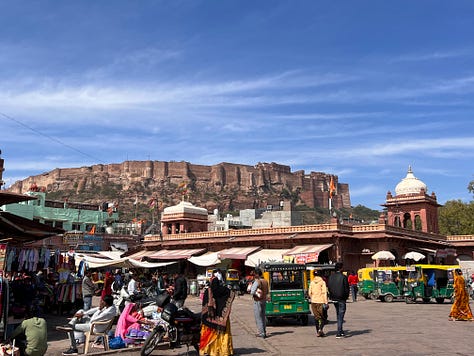
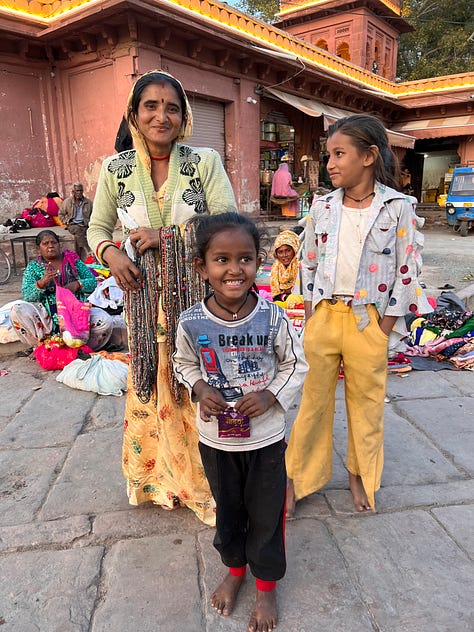
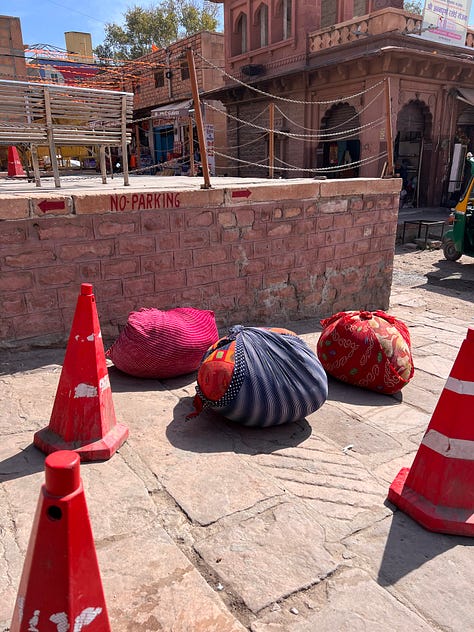
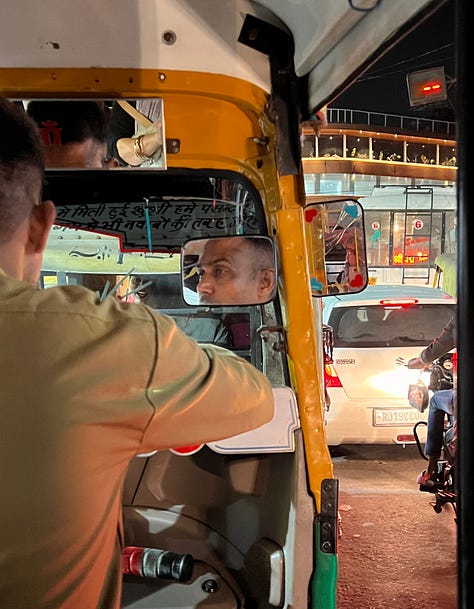
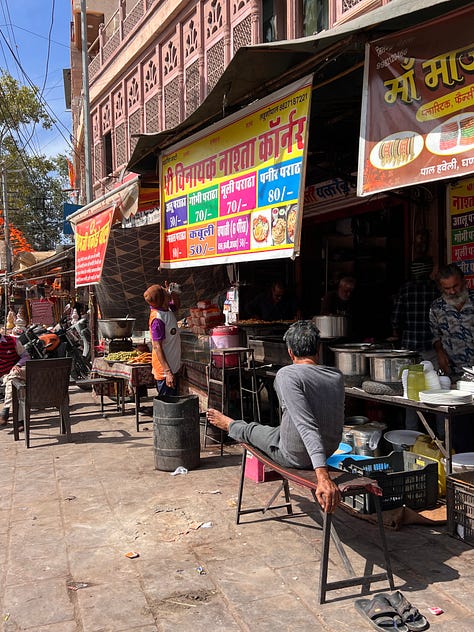

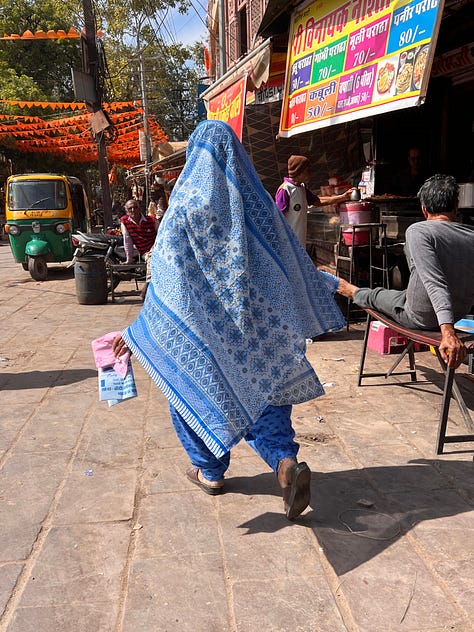

Andrew and I were joined for a large part of our time in Jodhpur by Ashutosh Joshi. Ash had met Andrew in Edinburgh, in the shop, having spent time in the UK at university and locked down in Scotland during the first covid wave. Ash is a rare young man, a deep and serious thinker with a twinkly sense of humour and an honest turn of phrase. His comment to me when I exhibited vertigo over the step well (the most astonishingly brilliant and beautiful piece of functional architecture ever designed) was “it’s your age”. He’s not wrong (those steps are steeep!!) but it took me a breath in order to realise he was trying to be funny, or rude or ageist - he was stating a fact. Being 62 is being older, things in me have changed. I may never have bounded down those steps gazelle-like in my youth but I would not have been dizzy at the thought. Now I am. It’s my age. It dawned on me that it’s ok to be my age and acknowledge the changes. Most people would not have said that. Ash, as I discovered after a few hours, is not most people. I could write a whole post on him but I am not going to because I (mostly) write about food and Ash doesn’t know much about food except what tastes nice and much as I like him and am now his aunty in Wales he needs to learn to cook before I write a whole piece on him.
Question - what is that vegetable? Answer - “I don’t know”. Question - what would you use that spice in? Answer - “I don’t know”. Question - what is that utensil for? Answer - “I don’t know. My mother would know. You should meet my mother.”
Read Ash’s story here, starting with the knowledge that he walked 1850km across India in order to better understand what is going on in the world and written a book about it. “The world is not how we are made to believe. Nature is a sacred force. We are all in a race to destroy ourselves at a much faster rate. I was thinking of Apocalypse. But this time it was the Greek meaning of apocalupsis that mattered, to die and re-generate. I understood that this world is a circle that only comes back to the start.”
Because Andrew had no business appointments lined up Jodhpur was more about being a tourist and having fun browsing the markets, buying saris and beads, spices and nicknacks. We visited the Fort - I can’t remember its name. It was big and beautiful and epic. Lots to look at, not least some arches inhabited by hundreds of swift’s nests. They were empty but I loved that they had not felt it necessary to evict them. Being a fort it was beautifully situated to gaze over the city, and that is when you really understand why it’s called the Blue City. It’s the kind of blue that makes you feel a bit swooney, lighter than Klein blue but with the same kind of mesmerising depth, aged and a little washed out.


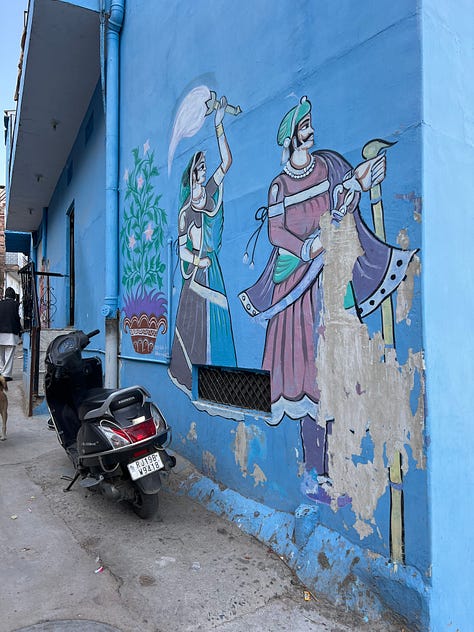
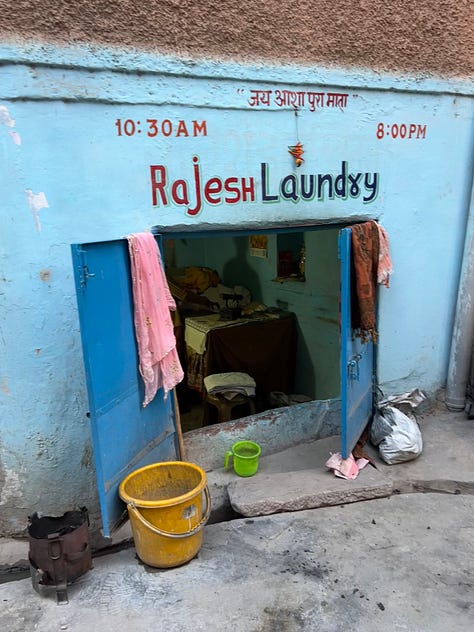
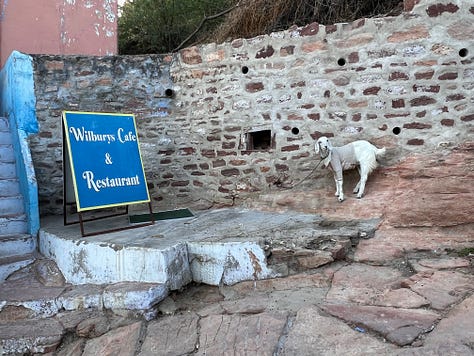
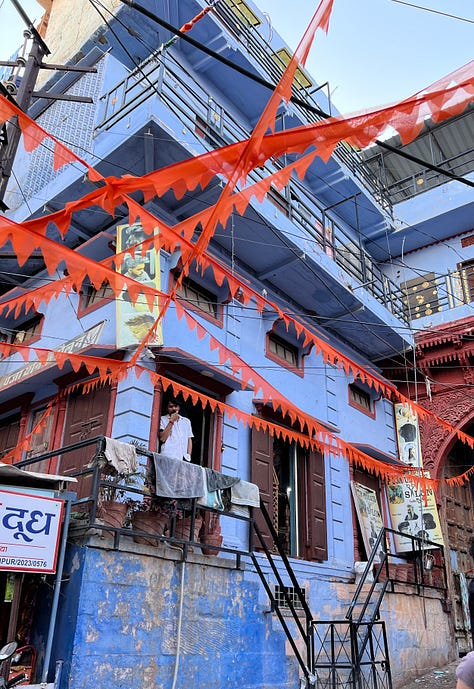
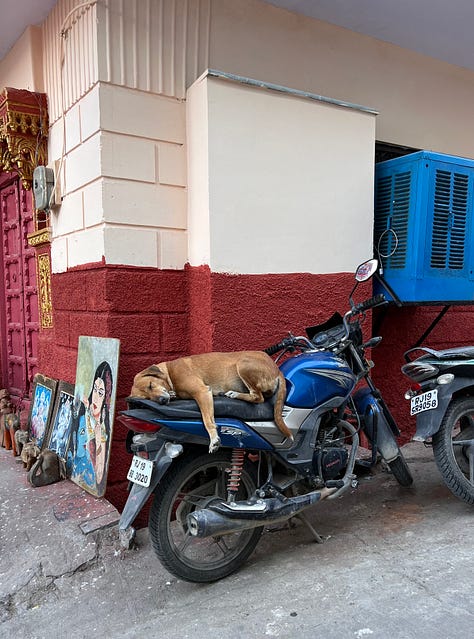

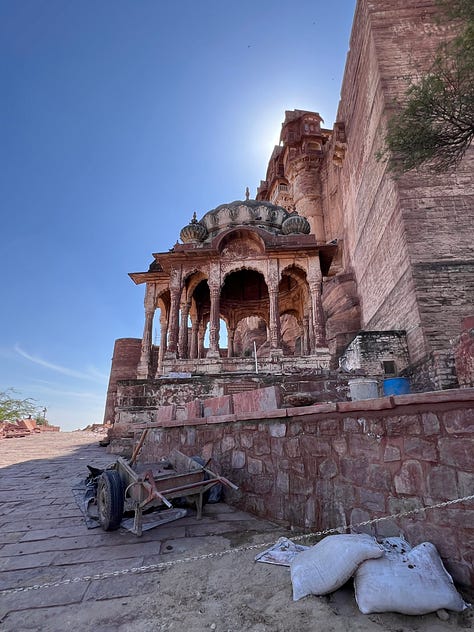
We were introduced to Ash’s grandfather, Shivji Joshi, a photographer of great renown and great hospitality, and his cousin Prachi who makes and sells lovely Indian cotton outfits - kurtas I think they are known as, please forgive if that’s wrong. More Joshis I could write whole posts on but maybe another day. It felt really special to be welcomed into a private home in this way, no questions, just come on in, and Shivji’s moustache definitely wins Most Effortlessly Grand Facial Hair medal.

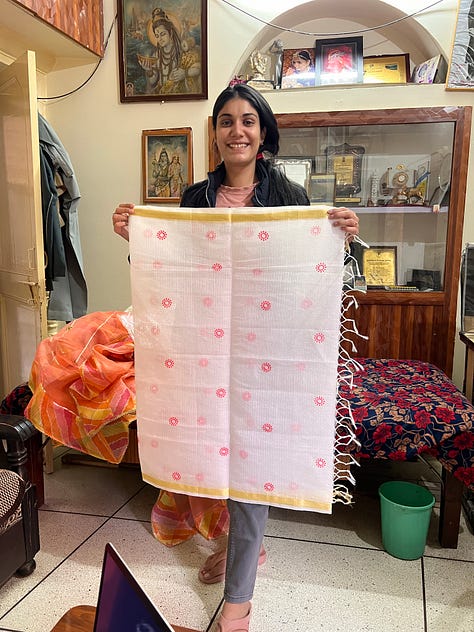
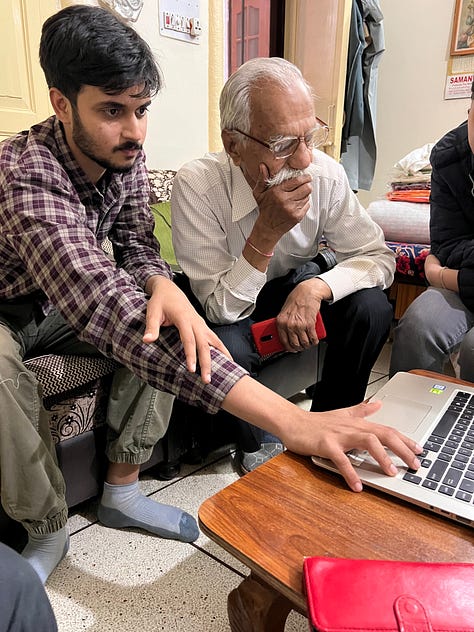

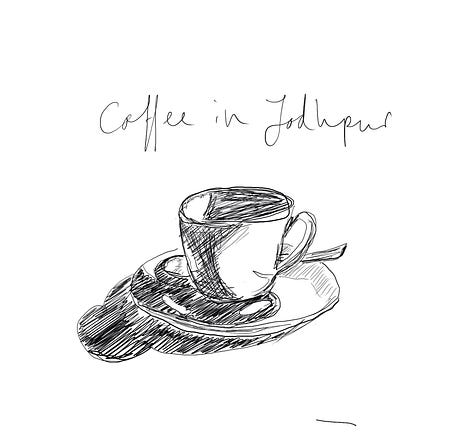
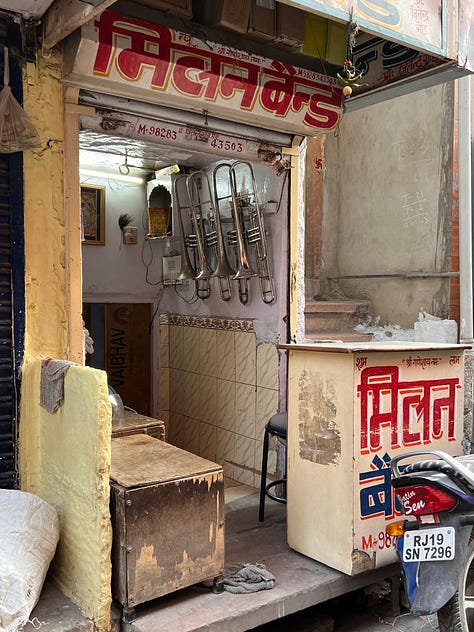


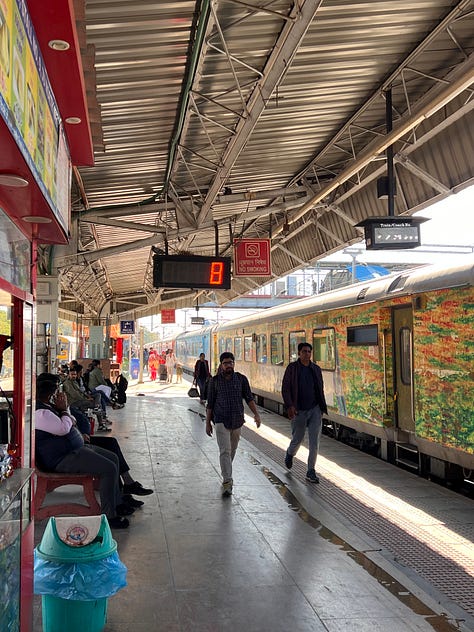
Apart from the most fantastically delicious samosas I have ever tasted food did not register high on Jodhpur’s attractions, apart from the feast for the eyes in the market. The food at the hotel was mediocre, but good enough and served so sweetly that made up for a lot.
Ash got us some of the samosas and another similar pastry, like a flying saucer, whose name I can’t remember, as a picnic for our train journey to Jaipur. That was definitely the highlight of that journey.
There is so much more to this city than I can begin to get down here - the higgledepiggledy streets, the human size of it, the noise and bustle, the oasis that is the Devi Bhawan hotel. I know too that I haven’t even scratched the surface of the surface where its food culture is concerned, so I simply have to go back, possibly via a visit to Ash’s mum near Mumbai so I know what I am looking at in the market, and with a place to stay where I can cook.
Note: It was about this time when I began to notice that women rarely serve in cafes and restaurants, or hotels unless, they are chains. In the Devi Bhawan all the waiters and reception staff were men. All the cleaners and sweepers were women. They do run stalls in the markets, their own it would seem, but the separation of the sexes is almost as marked as the separation between rich and poor, although this was definitely less marked to my eyes in Jodhpur than Delhi.
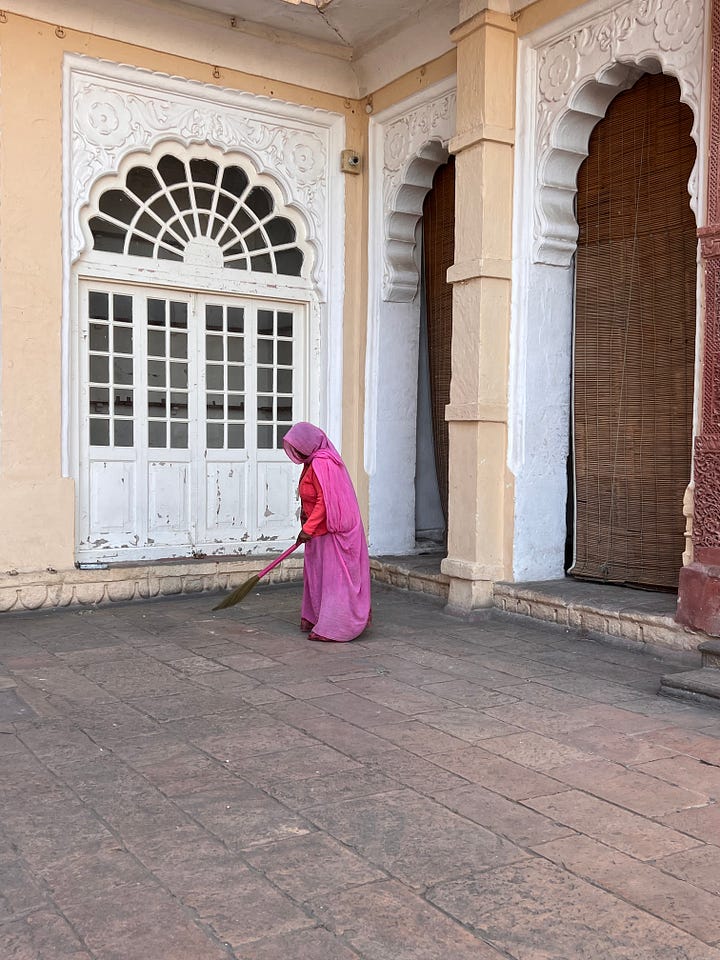
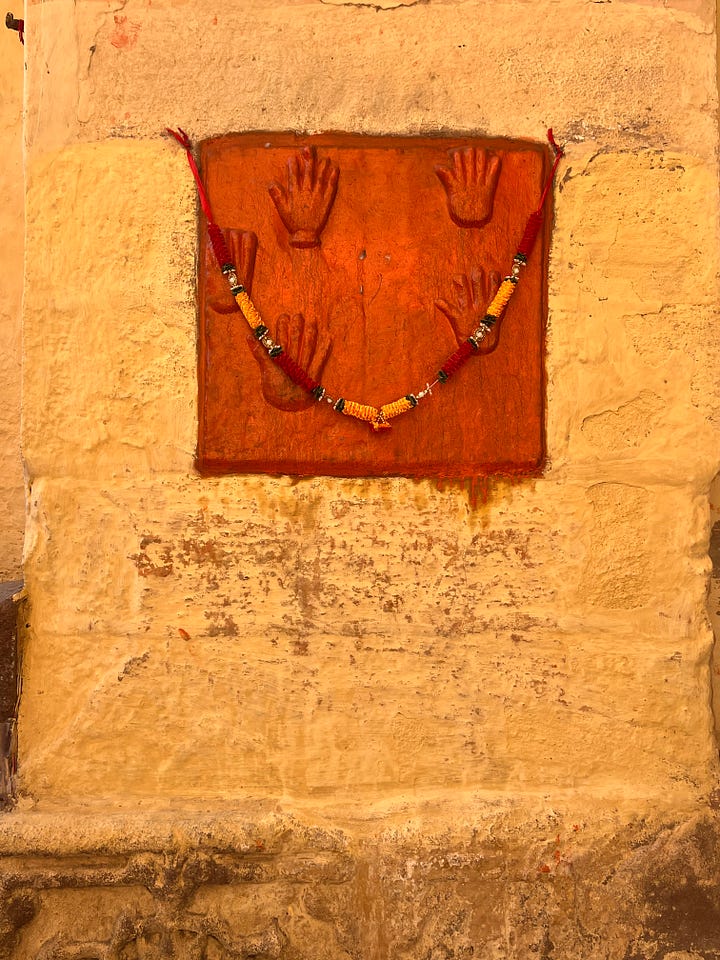

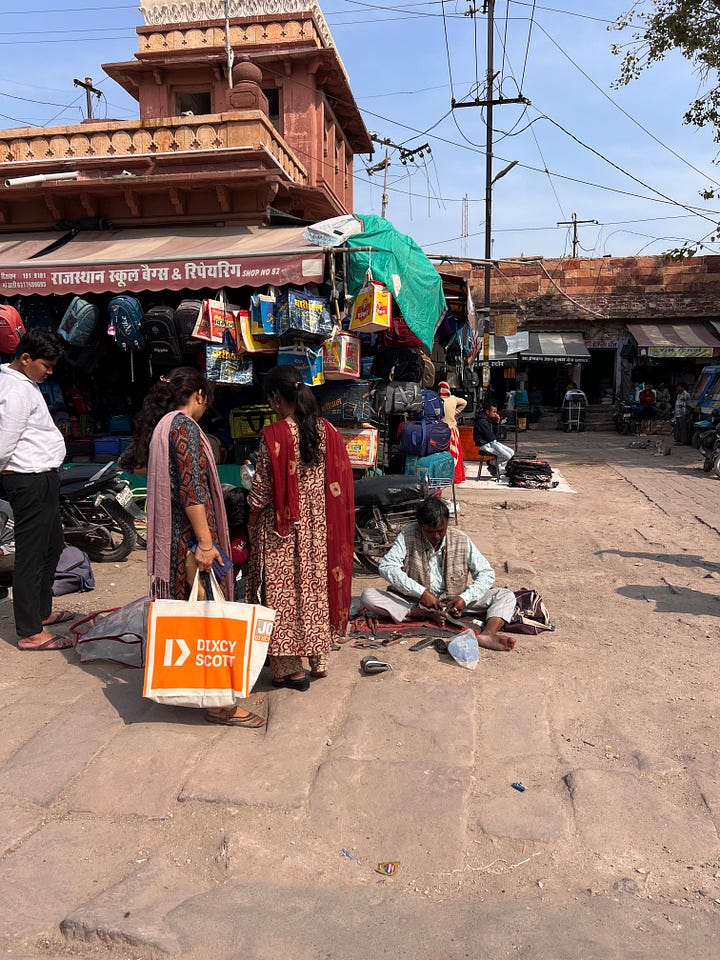




I can vouch for the numbers of objects purchased at the market. New suitcase was required to bring it back. Liz did not fly using Ryanair, that's for sure. Jodphur looks lovely, though I'm sure there must be some blue buildings in Cardigan. Not the same, I guess.
Liz, I LOVED this - and the piece about age struck me, having just read your IWD post about women in hospitality - the STORIES you have to tell and the people whose lives have overlapped with yours (I’m sort of obsessed with that idea, courtesy of the last part of Larkin’s The Whitsun’s Weddings) - I could listen to you forever.